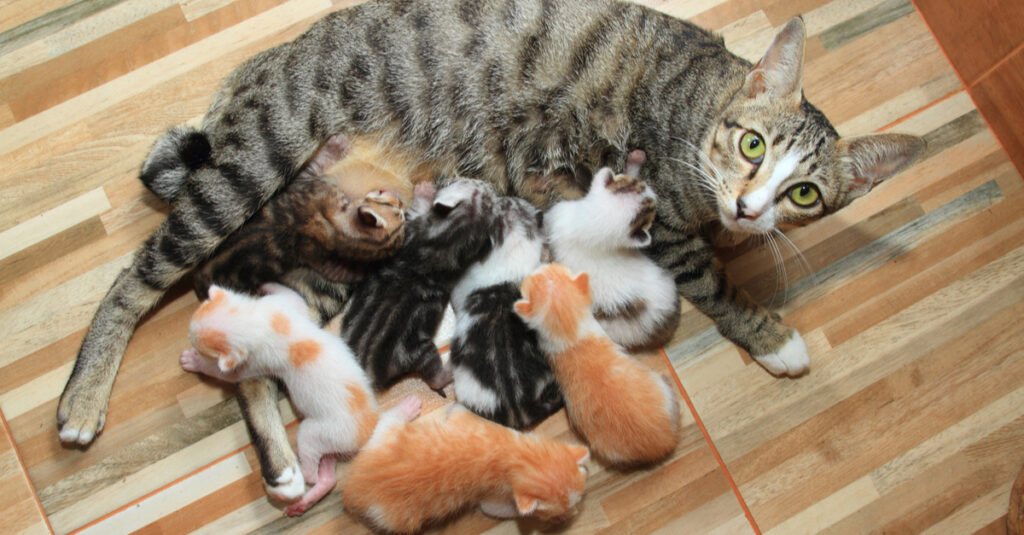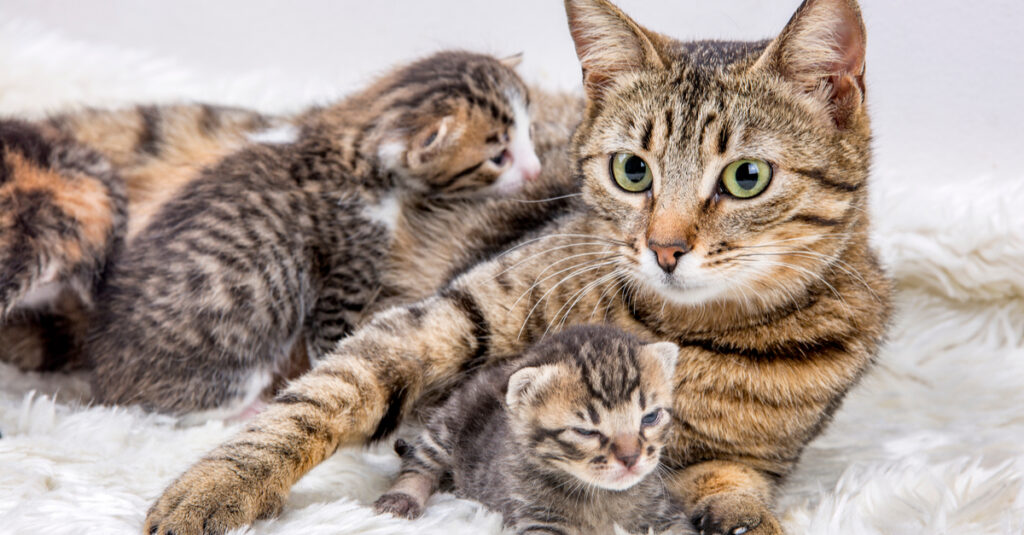Why is Mother Cat Panting While Nursing?
Is your mother cat panting while nursing? This seems to be a common thing with all nursing mothers, human and feline.
It’s completely normal, but it might be something you want to mention to a vet next time you’re in.
Grab the Puuurrr-fect Planner to keep track of your cat’s health and well-being ON SALE NOW!
The panting can be a sign of heat exhaustion or stress, and even if it’s not that, it’s a good idea to keep an eye on the little ones anyway.
If your cat is nursing kittens and panting, it may be because she is feeling hot or stressed out. The panting could also indicate that the mother is having trouble getting enough oxygen through her mouth while trying to feed all of her kittens at once.
What To Feed A Nursing Mother Cat
Nursing mother cats need more energy so they can nurse their kittens. This means they will need a food that is high in protein, fat and calories. It is important to give her food that she has been eating before the pregnancy.

Do not switch foods during pregnancy or while she is nursing because it could make them sick.
You can give her as much dry food as she wants to eat or you can feed her twice as much wet food as you normally would.
If you are switching from dry food to wet during pregnancy or while she is nursing, it is best to do it slowly over a week by mixing the two together.
A good quality cat food is one that lists meat as the first ingredient and does not list corn, wheat, soy, animal by-products or artificial colors and preservatives.
If you are feeding her canned food, it should have no more than 15% carbohydrates and have named protein sources like chicken and beef rather than just meat or poultry by-products.
Also read: Can Cats Give Birth Days Apart?
How Long Will a Cat Pant After Giving Birth?
This could be anywhere from a few hours to a few days, depending on how many kittens your cat had.
It’s normal for a cat to pant after giving birth, but it shouldn’t last too long. If your cat pants while she’s nursing her kittens, it’s because she’s excited and stressed out.
She might be nervous about being a new mom. Most cats will return to normal once they have recovered from labor.
If your cat is still panting after a day or two, I would recommend taking her to the vet as soon as you can.
If she is still panting after 48 hours and hasn’t stopped, there may be some underlying issues that need to be addressed.
Nursing Mother Cat Vomiting
Is your nursing mother cat vomiting?
If so, you may be worried, but rest assured that this is a normal part of her post-pregnancy recovery. Normally, this will begin after the first feeding session, during which she can bring up as much as a quarter of the food she consumed.
The after-feeding vomiting might be yellow or slightly green in color and contain some undigested food, along with mucus and bile.
If your cat has not eaten within the past 24 hours, then the vomit might also contain digestive fluid.
Mother cats who nurse their litters require a lot more calories than the average feline, and they will eat anything in sight (including non-food items).
Make sure she has plenty of food available to her at all times so that she can keep up her milk supply.
Other reasons your for your nursing cat to vomit include stress and tiredness
- Is she stressed? Cats are very sensitive to stress, and even subtle changes in their environment can be perceived as a threat to their kittens.
Even if you don’t think you’ve moved anything around or changed anything in the home lately, take a look at your cat’s surroundings. Make sure there’s nothing out of place that could be bothering her.
- Is she tired? Sometimes mother cats vomit due to exhaustion—they’re simply too tired from taking care of their kittens to bother keeping their food down.
If this is the case with your cat, consider giving them some extra space and quiet time for rest and recovery.
Read also: How Often Do Cats Get Sick?
When to Change Bedding After Cat Gives Birth?

According to the PetMD website its best to change the bedding after two or three days.
This is because cat urine has pheromones in it that your cat associates with motherhood, so you don’t want to get rid of it too quickly. If you do, your cat may try and move her kittens to another location.
To make sure your cat is comfortable, you may want to place a cardboard box or basket next to her bed. This way you can keep an eye on her while she’s nursing or taking care of herself after giving birth.
Should I Bathe My Cat After Giving Birth
The short answer is no. With any pet that has just had babies, it’s important to keep its stress levels as low as possible.
That’s why we generally recommend waiting until your cat has completely weaned her kittens before you give her a bath. This can take anywhere from four to six weeks, and during this time, she’ll have a lot on her plate!
Once your baby kitties have been weaned, you can bathe your mama cat in lukewarm water with a mild cat shampoo.
Just be sure to read the instructions to make sure that the particular shampoo you’re using is safe for kittens. We want baby kitties to be grooming themselves and possibly ingesting small amounts of their mama’s fur or skin.
Read: Can Cats Go 12 Hours Without Food?
How To Care for Newborn Kittens And Mother Cat
Not sure how to care for newborn kittens? We’ve got you covered.
For the first few weeks of their lives, kittens are completely dependent on their mother for food and warmth.
During this time, it’s very important that the mother cat receives healthy food and plenty of attention. This is to ensure that she can remain healthy and provide for her kittens.
As the kittens grow and become more active, they will be able to provide more and more for themselves, but until then it’s essential that you keep a close eye on them.
The first thing you should do is provide a warm, quiet space for the mother cat and her kittens. If you don’t already have one, invest in a heating pad.
Kittens are unable to regulate their own body temperatures until they’re 3 weeks old. So, providing an environment as close to their mother as possible is extremely important.
You should also give the mother cat a high-calorie diet to ensure that she has plenty of energy to nurse her kittens.
She may not want to eat much at first due to morning sickness, but once she gets back to eating again make sure she has enough food available to her at
How Often Should I Feed My Cat After Giving Birth
There’s no one-size-fits-all answer for this. But generally, new moms are pretty good at knowing how much food they and their kittens need.
If she seems like she’s just eating and eating, that’s normal, it’s a lot of work to feed a litter of kittens. But generally, your cat will be ravenous after giving birth, so you’ll need to feed her several times a day.
Newborn kittens nurse at least once an hour, so your cat will need to be fed frequently. You can expect her to want to nurse every two hours during the first week, and then every three hours by the second week.
By the third week, she’ll likely be down to only two feedings at night. She may also have a hard time producing enough milk for all of her kittens. So, you might need to supplement with kitten formula, which will keep them nice and full while they’re growing.
What To Do After Cat Gives Birth
Many cat owners wonder what to do after their pet gives birth. Here are a few tips for how to handle this exciting time!
1) Make sure the mother has access to plenty of food and water in the first week after giving birth. She will need approximately three times as much food as she usually eats.
That is about one cup of food per day for each pound she weighs. You may want to increase the number of litter boxes in the house, as well.
2) During the first week after giving birth, your cat will likely be very tired and will spend most of her time sleeping or nursing her kittens. Let her rest, and try not to disturb her while she is with her babies.
3) Make sure your cat’s kittens receive all of their vaccinations on time. This can help ensure that they stay healthy and grow up big and strong!
If you notice any signs that something might be wrong with either your cat or her kittens, such as lethargy or vomiting, speak with a veterinarian immediately so they can get the care they need right away.
When to Call Your Veterinarian
Call your veterinarian immediately if your cat is having trouble giving birth.
Or if she has given birth to all the kittens but still seems distressed.
Other signs of distress in your cat include:
- The mother stops eating or drinking
- She is running a fever
- Her vagina is red, swollen and/or painful
- She is not caring for her kittens, who are cold, unresponsive or crying often
FAQ
Can you leave a cat with newborn kittens alone?
It’s usually best to let a cat be with her kittens for at least the first couple of weeks. During this time, she will nurse them and keep them warm.
But she’ll also clean them and stimulate their bowels and bladders so they can eliminate waste.
But there are a few exceptions. Sometimes the mom can get sick, injured, or cannot care for her kittens (for example, if she’s not nursing or cleaning them).
In this case you should get in touch with a vet or local animal rescue organization right away.
You can leave the mom alone with her kittens only when they are old enough to be mobile. This is usually after they are around three weeks old.
How soon can a cat get pregnant after having kittens?
Cats are capable of multiple pregnancies in one year. This means you could have multiple litters of kittens on your hands if your cat goes unspayed.
If you want to avoid this, we recommend getting your cat spayed as soon as possible after she gives birth.
Most vets will tell you it’s best to wait until the cat is finishes nursing (which takes about 8 weeks). But some vets will spay cats as early as 2 weeks after giving birth.
However, if you choose to wait until the mother cat is finishes nursing her litter of kittens, she can go into heat at any time. That means she’ll be ready to mate again almost immediately after finishing nursing.
And since cats can become pregnant while they’re still lactating, this means that they can get pregnant while they’re still nursing their current litter!
So unless you want an endless supply of kittens on your hands, make sure to get your new mama spayed ASAP!
Final Thought on ‘Mother Cat Panting While Nursing’
It’s important to keep your pets healthy and happy, so check on them whenever you can to make sure that everything is okay.
In general, if you do this regularly, you’ll get to know their normal behavior patterns, and that will help prevent any confusion when problems are occurring.
Resources
https://www.petmd.com/cat/symptoms/cat-panting-why-it-happens-and-what-do-about-it
